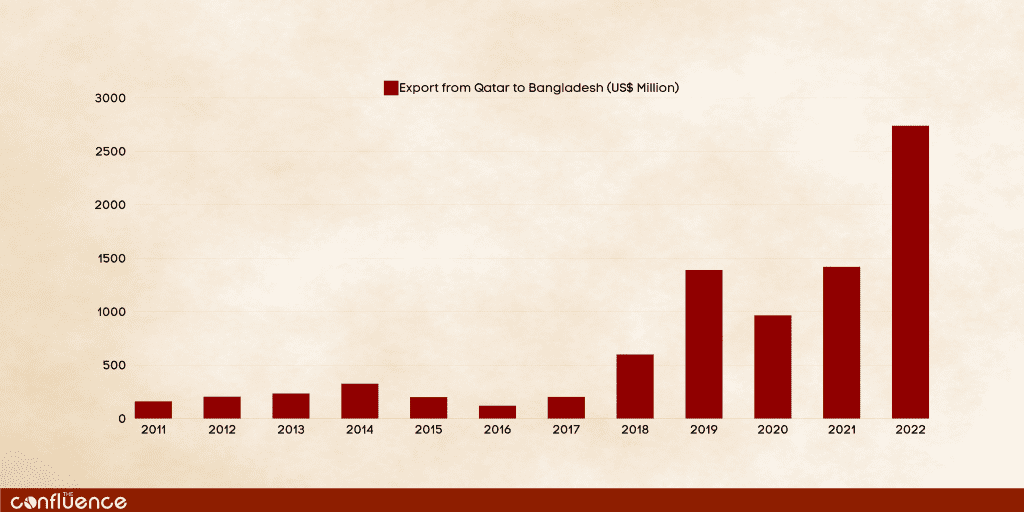The Emir of Qatar Sheikh Tamim bin Hamad Al Thani has recently concluded a three-day state visit in Asia where he touched the Philippines, Bangladesh and Nepal. This official visit to Bangladesh coincided with the establishment of 50 years of diplomatic relations between the two nations.
The two countries have signed 10 deals including five memoranda of understanding (MoU), spanning sectors such as maritime infrastructure, trade, investment, tax evasion, education and research, sports, security and diplomacy.
The five agreements signed
Legal Cooperation
An agreement for cooperation in the legal field between Bangladesh and the State of Qatar
Mutual Investment
An agreement on the promotion and protection of mutual investments
Double Taxation and Fiscal Evasion
An agreement on the avoidance of double taxation and the prevention of fiscal evasion with respect to taxes on income between Qatar and Bangladesh
Maritime Transport
An agreement on maritime transport
Joint Business Council
An agreement on the establishment of a Joint Business Council (JBC) between FBCCI & QCCI
The five MoUs signed
Sports and Youth
An MoU on cooperation in the fields of sports and youth between Bangladesh and Qatar
Employment
An MoU on cooperation in the field of manpower employment (Labour) between the Ministry of Labour, State of Qatar, and Bangladesh
Diplomatic Training
An MoU on cooperation in diplomatic training between Bangladesh and Qatar
Education and Research
An MoU for cooperation in the field of education, higher education, and scientific research between Bangladesh and Qatar
Port Management
An MoU between Qatar Ports Management Company “MAWANI QATAR” and Chittagong Ports Authority
Historical background on Bangladesh-Qatar Diplomatic Relations
The State of Qatar recognized Bangladesh as a sovereign State on 04 March 1974 following the 2nd OIC Summit held in Lahore in February 1974. It was also at this summit, Pakistan recognized Bangladesh’s independence.
“The lawmakers from Sindh [province] were flown into Lahore through C-130 aircraft, whereas legislators of other provinces also came in for a briefing by [then Prime Minister Zulfqar Ali] Bhutto. On the evening of February 19, Bhutto announced he had decided to recognize Bangladesh on the advice of Pakistan’s friends [heads of Muslim states].”

Zafar Ahmed
Photojournalist
It is believed that the State of Qatar played a crucial role in the introduction of Bangladesh as a sovereign state in the muslim world, as it was the only gulf nation to recognize the independence of Bangladesh during the lifetime of Bangabandhu Sheikh Mujibur Rahman. The historic visit of the Emir of Qatar, the first official visit of any Premier after Prime Minister Sheikh Hasina has secured a straight fourth term through the 12th Parliamentary Election has initiated a new wave of Diplomatic journey for Bangladesh.
As Bangladesh is slowly emerging as a middle power economy in South Asia, sitting at a critical juncture of maritime route, and Qatar, the Middle East’s No.1 Mediator for handling geopolitical crises among various conflicting parties around the world, this visit followed by the HPM Sheikh Hasina’s visit to Qatar in 2023 has ushered hope for Bangladesh as the country is set to graduate from LDC in 2026. Bangladesh tends to gain a lot from this visit of Emir Sheikh Tamim bin Hamad Al Thani, both Economically and Politically.
Growing Bilateral Trade
The bilateral trade between Bangladesh and Qatar has reached USD 3.5 billion in 2023. Qatar Exports to Bangladesh was US$2.74 Billion during 2022, according to the United Nations COMTRADE database on international trade. The main exports from Qatar to Bangladesh are Mineral fuels, oils, distillation products, and Fertilizers.
BANGLADESH-QATAR TRADE
$
0
B
Bangladesh-Qatar Bilateral Trade in 2023
US$ 2.74 Billion
Qatar Exports to Bangladesh in 2022
1.8-2.5 MTA as per a 15-year Contract
Bangladesh to import energy from Qatar
0
MT
LNG to be Imported Annually from 2026

Bangladesh signed an agreement with Qatar in 2017, to import some 40 containers of energy that means 1.8-2.5 MTA as per a 15-year contract. Bangladesh seeks a larger supply of LNG, amidst an energy crisis in Bangladesh due to global supply chain crisis and ongoing dollar shortage in the country to meet the growing demands for its industries. Bangladesh’s Petrobangla has signed an agreement with Qatar Gas in January this year to import 1.5 million tonnes of LNG annually. The agreement will be implemented in 2026.
“I promise you that I, being the Amir, will provide all sorts of facilities to you as you are a friendly country,”
Amir Sheikh Tamim Bin Hamad Al Thani was quoted as telling Prime Minister Sheikh Hasina during a meeting at Amiri Diwan in Doha in 2023.
BANGLADESH EXPORTS TO QATAR in 2023
0
%
Average Annual Increase in Exports from BD to Qatar
$14.2 M
Knit T-shirts
$9.58 M
Non-Knit Men’s Suits
$6.1 M
Non-Knit Men’s Coats
0
Manpower export to Qatar from Bangladesh
The main products that Bangladesh exported to Qatar are Knit T-shirts ($14.2M), Non-Knit Men’s Suits ($9.58M), and Non-Knit Men’s Coats ($6.1M). During the last 27 years the exports of Bangladesh to Qatar have increased at an annualized rate of 21.2%. Bangladesh’s economic stake with Qatar resides significantly with its manpower export as the gulf nation is home to some 400,000 expatriates from Bangladesh.
Bangladeshi workers played a crucial role in Qatar’s hosting of the Fifa World Cup in 2022. Bangladesh started exporting manpower for employment of temporary migrants to Qatar in 1976 when this Middle Eastern Arab State began to implement infrastructure projects including roads, breezes, buildings, hotels etc. However, manpower export from Bangladesh to Qatar got new momentum in 2012 when Qatar started to build football stadiums and other related infrastructures to prepare itself for the World Cup Football 2022 and to materialize its Vision 2030. Qatar has expressed interest to import skilled manpower from Bangladesh in the Engineering and the Healthcare sector.
The Rohingya Repatriation issue
Perhaps for Bangladesh it is important to take note of Qatar’s growing mediation and multilateral diplomatic prowess in ending conflicts whether be it in 2008 Lebanon conflict, the US-Taliban peace talks held in 2018, and the current Israeli war on Gaza. Prime Minister Sheikh Hasina’s administration looks to Qatar for finding a diplomatic solution to the Rohingya crisis. Bangladesh has been home to more than a million Rohingya refugees who fled an ethnic genocide in Myanmar in 2017. On principles of human rights, Bangladesh stood strong and opened the gates to the Rohingya muslim minority group.
The huge influx of refugees in a country which has a population of over 160 million most of whom make less than 3000 USD per annum has put a great burden on the people and economy recently given the global economic uncertainties and shifting of focus of the humanitarian aid to Ukraine and Palestine. The WFP has already cut food aid to the Rohingya refugees. Despite the growing pressure, Bangladesh has maintained steadfast commitment in finding a diplomatic solution over a military one to prevent further loss of lives.
Qatar’s interest in this region could also be tied to the repatriation of Rohingyas to bolster the gulf state’s diplomatic capabilities to contain and end conflicts. Asia is the fastest growing region in the world and energy demand of this region is projected to rise further in the coming decade. If it achieves significant momentum on the Rohingya issue, Qatar will become a significant geopolitical player in South Asia which is home to multiple nuclear powers and is becoming a region of tension due to growing rivalry between China and the United States.
Potential of Growing Economic Partnership
The economic partnership between Qatar and Bangladesh has achieved remarkable growth in the last two decades. Exports from Bangladesh to Qatar rose from 2.37 million USD to 89.43 million in 2022. Conversely, Qatar’s export to Bangladesh rose from 4.55 million in 2000 to a staggering 2.7 billion USD.
Increased from $2.37 M to $89.43 M in 2022
Exports from Bangladesh to Qatar
Increased from $4.55 M to $2.7 B in 2022
Exports from Qatar to Bangladesh
The strategic importance of Prime Minister Sheikh Hasina’s Qatar visit in 2023 has been instrumental in shaping the Economic relationship that is set for a transformation from the present status which is heavily dependent on the energy and manpower trade.
Qatar, which has a sovereign wealth fund of $475 billion USD, is looking for trade and investment opportunities worldwide and Bangladesh can benefit greatly as the country is struggling to attract significant FDI due to not having a very conducive environment for foreign investment, issues with bureaucratic red tape and trade barriers.
The signed agreements on the promotion and protection of mutual investments, avoidance of double taxation, and the prevention of fiscal evasion with respect to taxes on income between the two states, maritime transport is hoped to improve the business environment between both the nations. The establishment of a Joint Business Council between FBCCI and QCCI will promote trade and investments but the success of these agreements will depend largely on Bangladesh’s willingness to take necessary steps to make the country an attractive destination of Qatari investment.
Qatar which is heavily dependent on energy exports for its earnings may find the proposals of establishing an exclusive economic zone in Bangladesh and investment opportunities in setting up specialized tourist zones in Cox’s Bazar, the largest sea beach in the world and is set to inaugurate the 4th International airport to improve connectivity with the rest of the world. Bangladeshi authorities must take steps to follow up on this visit of the Emir, which has paved the way for an expansion of trade relations between the two friendly nations.
Labor Rights and Protection: A Long Standing Issue
Bangladesh’s economy depends greatly on the remittances sent by the expatriates and Qatar is home to a close 400,000 Bangladeshi migrant workers which are also indispensable to Qatar’s economy. Qatar’s protection and safeguarding of migrant labor rights has been inadequate and migrant workers from Bangladesh have suffered hardships due to abuse, wage theft, contract violations and unsafe working conditions.
$
0
Recruitment Cost from Bangladesh to Qatar
A 2020 survey by ILO found that the average recruitment cost from Bangladesh to Qatar was about USD $3,863, which is equivalent to 18 months earning in Qatar. Human Rights Watch has accused Qatar-based companies in driving up the cost of recruitment fees. It is imperative for the advancement of bilateral relationships between both countries that labor rights are addressed and enforced properly. In this regard Bangladesh’s diplomatic outreach in safeguarding its expatriates will be extremely necessary.
Qatar-Bangladesh Defense Cooperation
Defense cooperation between the two nations has progressed steadily over time as both nations have close cooperation in case of training, military exercises and deployment of Bangladesh armed forces members to Qatar on deputation. Qatar and Bangladesh signed a defense agreement in Doha on March 7, 2023 to solidify the defense ties between both the nations which was a follow-up of an MOU linked in 2022.
$
0
M
Bangladesh’s earning through Qatar Defense Collaboration
0
Armed Forces Members Approved to Go on Deputation to Qatar
Bangladesh cabinet has approved a deal to send 1129 members of the Armed forces of Bangladesh to Qatar on deputation, a strategic move to foster a direct integration between the defense forces of both nations. Bangladesh earns remittances estimated at $3million USD through collaborating with Qatar on the matters of defense.
Conclusion
Bangladesh has been on a diplomatic hustle on East, West and South to safeguard its vital national interests through dialogue, multilateral diplomacy and economic cooperation. The country has achieved key economic developments over the last decade and is set to become a trillion-dollar economy by 2040.
The recent strategic developments on the relationship with Japan, France and various other nations has signaled an assertive foreign policy of Bangladesh to make its voice heard in the international stage to protect its national interests. The latest visit by the Emir of Qatar has ushered in a hope that Bangladesh’s relationship with other gulf nations will experience significant growth in future.
About the Author

Tanmoy Dhar is an Economics graduate from the University of Dhaka. He has served an associate at CounterFoto- A Center for Visual Arts.